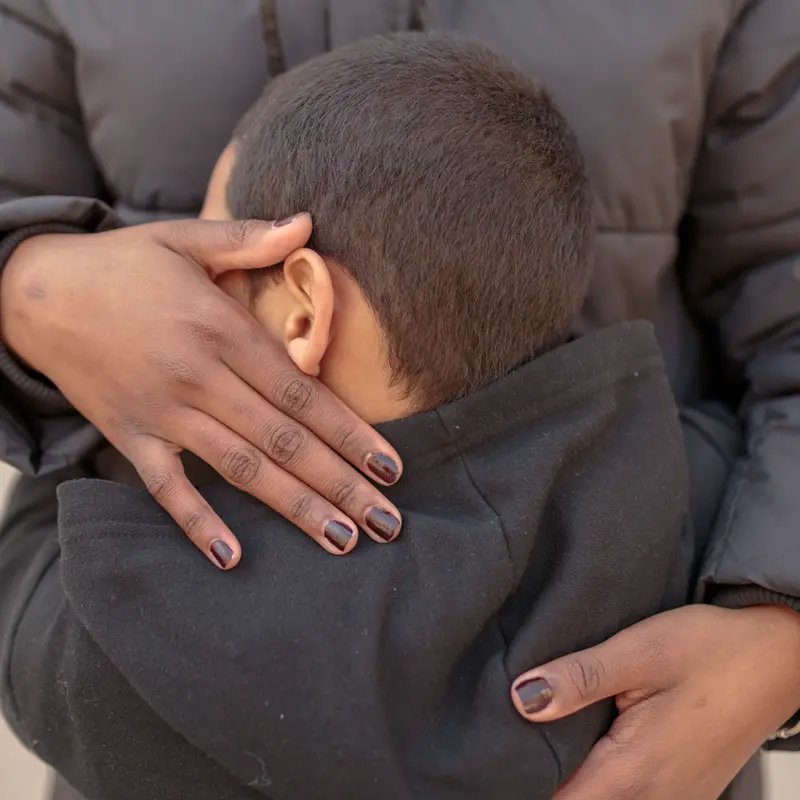This article was produced for ProPublica’s Local Reporting Network in partnership with THE CITY. Sign up for Dispatches to get stories like this one as soon as they are published.
In a panic, if she floors it, Marilyn Blanco can drive from her job at the Rikers Island jail complex to her son Ian’s school in Harlem in less than 18 minutes.
Nine times since December, Blanco has made the drive because Ian’s school — Success Academy Harlem 2 — called 911 on her 8-year-old.
Ian has been diagnosed with ADHD. When he gets frustrated, he sometimes has explosive tantrums, throwing things, running out of class and hitting and kicking anyone who comes near him. Blanco contends that, since Ian started first grade last year, Success Academy officials have been trying to push him out of the school because of his disability — an accusation similar to those made by other Success Academy parents in news stories, multiple lawsuits that resulted in settlements and a federal complaint.
When giving him detentions and suspensions didn’t stop Ian’s tantrums, Blanco said, the school started calling 911. If Blanco can’t get to Ian fast enough to intervene, a precinct officer or school safety agent from the New York Police Department will hold him until an ambulance arrives to take him to a hospital for a psychiatric evaluation — incidents the NYPD calls “child in crisis” interventions.
The experience has been devastating for Ian, Blanco said. Since the 911 calls started late last year, he’s been scared to leave his house because he thinks someone will take him away. At one ER visit, a doctor wrote in Ian’s medical file that he’d sustained emotional trauma from the calls.
Citywide, 911 calls originating from schools in the Success Academy Charter School network — which operates 49 schools, most of them serving kids under 10 years old — were made at least 87 times to respond to students in emotional distress between July 2016 and December 2022, according to an analysis of NYPD data by THE CITY and ProPublica.
If Success Academy were run by the city Department of Education, it would be subject to rules that explicitly limit the circumstances under which schools may call 911 on students in distress: Under a 2015 regulation, city-run schools may never send kids to hospitals as a punishment for misbehavior, and they may only involve police as a last resort, after taking mandatory steps to de-escalate a crisis first. (As THE CITY and ProPublica reported this month, the rules don’t always get followed, and city schools call 911 to respond to children in crisis thousands of times a year.)
But the regulation doesn’t apply to Success Academy, which is publicly funded but privately run and — like all of the city’s charter school networks — free to set its own discipline policies.
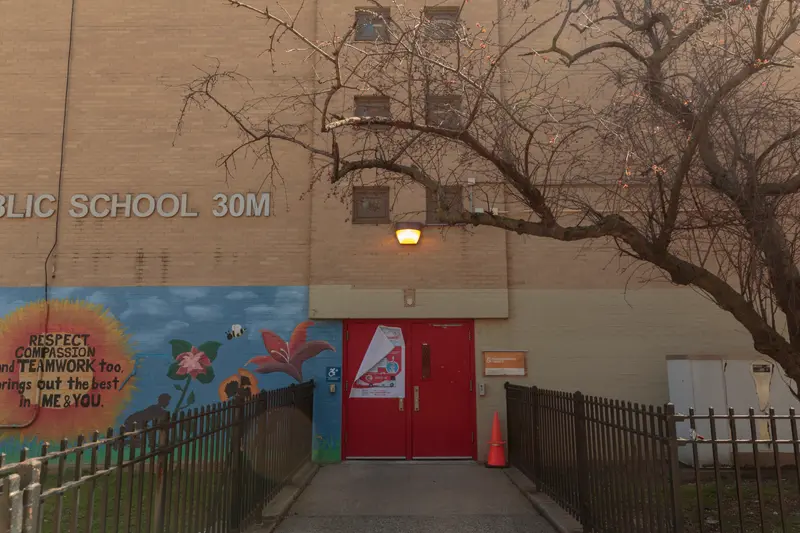
The consequence, according to education advocates and attorneys, is that families have nowhere to turn if school staff are using 911 calls in a way that’s so frightening or traumatic that kids have little choice but to leave.
“Sure, you can file a complaint with the Success Academy board of trustees. But it isn’t going anywhere,” said Nelson Mar, an education attorney at Legal Services NYC who represented parents in a 2013 lawsuit that led to the restrictions on city-run schools.
Success Academy did not respond to questions about the circumstances under which school staff generally call 911 or the criteria they use to determine whether to initiate child-in-crisis incidents.
Regarding Ian, Success Academy spokesperson Ann Powell wrote that school staff called EMS because Ian “has repeatedly engaged in very dangerous behavior including flipping over desks, breaking a window, biting teachers (one of whom was prescribed antibiotics to prevent infection since the bite drew blood), threatening to harm both himself and a school safety agent with scissors, hitting himself in the face, punching a pregnant paraprofessional in the stomach (stating ‘I don’t care’ when the paraprofessional reminded him that ‘there’s a baby in my belly’), punching a police officer and attempting to take his taser, and screaming ‘I wish you would die early.’”
Powell also provided documentation that included contemporaneous accounts of Ian’s behavior written by Success Academy staff, photographs of bite marks and a fractured window, an assessment by a school social worker concluding that Ian was at risk for self-harm, and a medical record from an urgent care facility corroborating the school’s account that a teacher had been prescribed antibiotics.
Blanco said that Success Academy administrators have regularly exaggerated Ian’s behaviors. When he was 6, for example, Ian pulled an assistant principal’s tie during a tantrum, and school staff described it as a choking attempt, according to an account Blanco gave to an evaluator close to the time of the incident. Each time Success Academy has sent Ian to an emergency room, doctors have sent him home, finding that he didn’t pose a safety threat to himself or others, medical records show. (Success Academy did not respond to questions about the assertion that staffers have exaggerated Ian’s behaviors.)
Blanco knows that Ian is struggling. No one is more concerned about his well-being than she is, she said. But villainizing her 8-year-old only makes the situation worse.
“It’s like they want to tarnish him,” Blanco said. “He’s just a child, a child who needs help and support.”
“Things are already hard enough” for Ian, Blanco continued. “Kids born with special needs — they didn’t choose that walk of life. Ian didn’t pick this. They don’t have the right to punish him for it.”
Back in 2020, when Ian was 4, Blanco was thrilled to get him a spot at Success Academy. She and Ian live in the South Bronx, in the same neighborhood where Blanco grew up. At Ian’s city-run neighborhood school, P.S. 62, just 14% of students passed state reading exams last year.
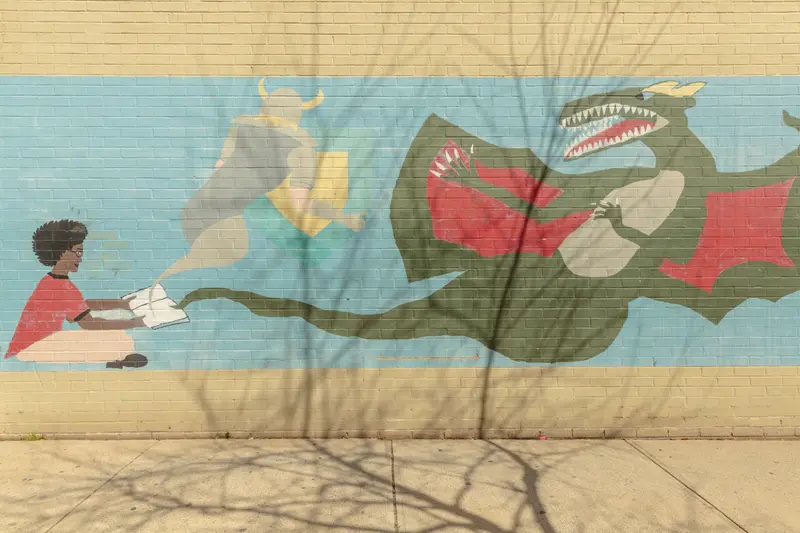
Success Academy, which has avid support from many parents and is led by former New York City Councilmember Eva Moskowitz, promotes itself as an antidote to educational inequality, offering rigorous charter school options to kids who might not have other good choices. On its website, the network advertises its students’ standardized test scores (pass rates for Black and Latino students are “double and even triple” those at city-run schools) and its educational outcomes: 100% of high school graduates are accepted to college, the network says.
Success Academy administrators say that strict and consistent discipline policies are essential to kids’ learning. Students are required to follow a precise dress code and to sit still and quietly, with hands folded in their laps or on their desks. When students break the rules, the school issues a progressive series of consequences, including letters home, detentions and suspensions.
Once students are accepted through the Success Academy lottery, the network is required to serve them until they graduate or turn 21, unless they withdraw or are formally expelled.
But critics, including parents who say their kids were pushed out of Success Academy schools, have long claimed that the network achieves its academic results by getting rid of students with disabilities — especially those with mental health or behavioral challenges that make it impossible to follow the school’s rigid comportment rules. In 2015, The New York Times reported that a Success Academy school in Fort Greene, Brooklyn, had drawn up a list of students with the heading “Got to Go.” The network’s officials responded to the report by saying that the list had been a mistake, and that the school’s principal had been reprimanded.
A year later, a group of parents, accompanied by then-New York City Public Advocate Letitia James, filed a complaint against Success Academy with the federal education department, claiming that the network discriminated against students with disabilities, including by threatening to file child welfare reports and to call 911 on children if their parents didn’t pick them up on demand. (The investigation is still open.)
In 2019, the New York State Education Department found that Success Academy had failed to provide mandatory services for students with disabilities and refused to follow orders issued by hearing officers.
Success Academy did not respond to questions from THE CITY and ProPublica about the investigations.
Critics have paid less attention to the fact that Success Academy is not subject to city rules governing 911 calls — an exemption the network takes full advantage of, according to accounts from parents, attorneys and two former staff members who spoke to THE CITY and ProPublica.
“The path is detentions, suspensions, parent meetings. A 911 call is the next step in the escalation,” said Livia Camperi, who was an English teacher at a Success Academy school in Brooklyn until March. Camperi said she was fired because she disagreed with a new principal about increasingly “draconian” discipline practices. On the day she left the school, an assistant principal called an NYPD safety agent on a middle school student who stayed seated after being instructed to leave a classroom, according to Camperi, who showed THE CITY and ProPublica text messages from students and staff that corroborate her account.
In response to questions about this incident, Powell, the Success Academy spokesperson, wrote that the student was shouting and banging on a desk. Educators “were concerned that the student wasn’t following directions and might become violent so they called school safety,” Powell wrote. “It is appropriate to involve school safety when there are possible safety issues.”
Powell did not comment on the circumstances under which Camperi was fired.
In Harlem, Ian started struggling at Success Academy just a few weeks into first grade. He’d never been aggressive before he started school, Blanco said. Because of the COVID-19 pandemic, he’d attended kindergarten online. When schools went back to in-person instruction, he was a high-energy 6-year-old who couldn’t follow Success Academy’s strict rules requiring him to sit still and stay quiet. By the end of first grade, Ian’s school issued him 19 suspensions, though he was later excused of serving five of them.
The more Ian got in trouble, the worse he felt about himself and the worse his behavior became, Blanco said. He started falling behind because he missed so much class time during his suspensions, according to his education records. At home and at school, he said that teachers disciplined him because he was a “bad kid.”
At first, Blanco worked hard to cooperate with the school, she said. She was worried by the change in Ian’s behavior, and she thought that school staff had his best interests at heart. But then an assistant principal called her into an office and told her that Success Academy wasn’t a “good fit” for Ian, Blanco said to THE CITY and ProPublica, as well as in a written complaint she sent to Success Academy at around that time. (Success Academy’s board of trustees investigated the complaint and did not find evidence of discrimination against Ian, according to a September 2022 letter to Blanco from a board member.)
“That didn’t sit right,” said Blanco, who is an investigator at Rikers Island and is accustomed to gathering paper trails. She asked the assistant principal to put the statement in writing, but he told her she had misunderstood, she said. (Success Academy did not respond to questions about this incident.)
Several times, when the school called Blanco to pick Ian up early, staff told her to take him to a psychiatric emergency room for an evaluation. But the visits didn’t help, Blanco said. “You could be sitting there for six, seven, eight hours,” waiting to talk to a psychologist. Because Ian never presented as an immediate threat to himself or others, hospital staff couldn’t do much but refer him to outpatient care and send him home, according to hospital discharge records.
Eventually, Blanco found an outpatient clinic that would accept her insurance to evaluate Ian for neurological and behavioral disorders. She said she begged school staff to stop disciplining Ian while she worked to get him treatment, but the suspensions were relentless. Once, he missed 15 straight days of school.
At the beginning of Ian’s second grade year, Blanco reached out to Legal Services NYC, where Mar, the education attorney, took her on as a client.
Mar filed a complaint on Blanco’s behalf with the state education department, which concluded that Success Academy had failed to provide Ian with services required by his individualized education plan. He also represented her in hearings to determine whether Ian’s suspensions were for behavior that resulted directly from his disability, which ultimately reduced the number of days that Ian was barred from school. But there was little they could do about the fact that the suspensions just kept coming.
When parents of kids at city-run schools believe their children have been unfairly disciplined — including through inappropriate suspensions or unnecessary 911 calls — they can appeal for help first from the superintendent of their community school district or the city’s Department of Education, and then from the state education department, which oversees the city agencies.
Charter school families, on the other hand, often have “no opportunity for redress,” Mar said. In certain cases, students or parents can file a complaint with the State University of New York, which authorizes Success Academy’s charter and has the power to revoke it. But neither SUNY nor the state education department have regulations governing 911 calls, and SUNY will only consider a complaint if students or parents can show that a school violated the terms of its charter or broke the law — which is very difficult to prove in the case of 911 calls, since school staff have room for discretion in emergencies, including serious threats of suicide or self-harm.
“SUNY does not condone the use of 911 as a form of discipline and that is made clear when schools seek guidance. We also do not substitute our judgement if a school administrator believes a child in distress needs emergency services,” wrote Mike Lesczinski, director of communications for the SUNY Charter School Institute.
The state education department did not respond to requests for comment.
In January, Blanco called Mar again as she sped from Queens to Harlem. Ian had had another tantrum, and Success Academy had once again called 911. Mar raced to the school, where he and Blanco found Ian in a hallway, sobbing. Four uniformed police officers and two EMTs towered over him, Mar and Blanco said.
Mar and Blanco said school staff told them that they had isolated Ian in an office because he was behaving aggressively and then he’d tried to open a window. The school, however, said it was Ian who tried to close himself in the room and prevent school staff from coming in.
Mar said the school claimed that Ian was “exhibiting suicidality.” But Ian told Mar and Blanco that he’d never planned to hurt himself; he just didn’t want to be confined alone in an office. “He was trying to do what any logical person would do,” Mar told THE CITY and ProPublica. “He wanted to get out of the situation.”
Blanco told the EMTs that she did not consent to them putting Ian in an ambulance. Instead, she drove him herself to the psychiatric emergency room at Manhattan’s Bellevue Hospital for an evaluation, she and Mar said. As with all the other ER trips, hospital staff evaluated Ian, determined that he wasn’t at risk of harming himself and sent him home.
Shortly after the January 911 call, Blanco’s doorbell rang. It was a caseworker from the Administration for Children’s Services, New York City’s child welfare agency, there to investigate a report that Blanco was neglecting Ian’s medical care.
The allegation seemed absurd to Blanco, since Ian is under the care of a neurologist, was on waitlists for outpatient therapy at several clinics, and has been assessed multiple times by ER doctors who determined he was not at risk of self-harm, according to Blanco’s account and medical records. “I’ve done everything in my power to try and get him help,” Blanco said.
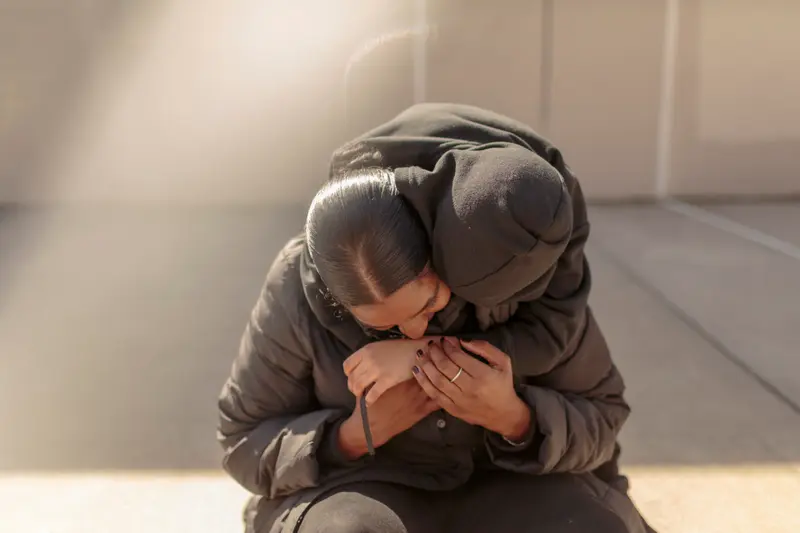
Because people who report concerns to child welfare agencies are typically kept anonymous and the investigation is still open, Blanco couldn’t immediately find out who made the complaint against her. However, Powell from Success Academy wrote that school staff reported Blanco for child neglect in January, after Blanco refused to allow EMTs to put Ian in an ambulance. (In this instance, the school had called a mobile crisis unit to respond to Ian before calling 911, Powell wrote, but the unit was not available.) School staff were concerned that, despite “Ian’s repeatedly exhibiting self-injurious behaviors,” Blanco had shown a pattern of “neglecting her child by failing to provide appropriate and necessary mental support for him,” Powell wrote.
Success Academy made a second child welfare report against Blanco in April, after another incident in which Ian’s parents refused to allow EMTs to take him from school by ambulance. In that instance, Powell wrote, lieutenants from the NYPD and EMS said that Ian needed to be evaluated in a hospital because he’d said he wanted to harm others, and that emergency services personnel would be required to alert the Administration for Children’s Services if Ian’s parents refused the recommended level of care.
“We had utterly no choice in the matter,” Powell wrote. “Declining to notify ACS when the police have specifically concluded there is a duty to do so would have been a flagrant, deliberate and criminal violation of our reporting duties.”
It’s not uncommon for schools to file child welfare reports against parents who refuse to allow their children to be taken from school by ambulance — even if the kids are in treatment and the parents believe that being forcibly removed from school would be traumatic and unhelpful, according to several education attorneys and parents who told similar stories to THE CITY and ProPublica. School employees, who are legally required to report suspected abuse or neglect, make thousands of unfounded child welfare reports each year.
“I don’t know if schools really understand how much pain they add to a stressful situation when they make a child welfare report,” said Jenn Choi, who works as an educational advocate for parents of children with disabilities. Ten years ago, Choi was subject to a child welfare investigation after a school bus attendant called 911 on her son, who’s autistic.
At Blanco’s apartment, the investigator peered into her refrigerator and cabinets and took Ian into a separate room to interview him alone. “It was very invasive and humiliating,” Blanco said.
She felt besieged by forces she couldn’t possibly withstand. “I know how this works. I’m a single mom, I live in the Bronx, I’m a minority, I’m a dark-skinned woman. So automatically, it must be a broken home,” Blanco said. “I’ve cried my eyes out. I’m not the person that I was prior to my son going into that school.”
The 911 calls and the child welfare case are taking their toll on Ian, too. He gets nervous now when he sees police cars on the street, Blanco said. “I’m law enforcement. I don’t teach him to be afraid of police.” In February, he told a therapist that the only place he feels safe is at home.
One month after the child welfare visit, things got even worse. Blanco was in Queens, heading to work to pick up some overtime, when the school called to say that Ian had had another tantrum. This time, she was too late to bring Ian home herself. He was in an ambulance, on his way to Harlem Hospital.
“I started having a panic attack,” Blanco said. “I just kept thinking about him being taken away by strangers and I’m not there. I don’t know if he complied and got in the ambulance of his own accord. I don’t know if they forced him. I don’t know what they’re telling him, what they’re doing to him, what they’re making him feel.”
She was crying too hard to drive, so she called Ian’s dad, who left a barbershop halfway through a haircut to pick up Blanco and rush to the hospital. When they arrived and Blanco saw that Ian was safe, her panic turned to something else. “I was so angry but at the same time I felt so defeated. I’m fighting a lost cause,” she said. “I felt so small and helpless that I couldn’t even defend my own child.”
Two weeks ago, Success Academy sent Blanco an email informing her that they requested a hearing to have Ian removed from school for up to 45 school days because he “is substantially likely to cause injury to himself and others while in the Success Academy community.”
Ian would be barred from Success Academy immediately, the email said, even though it could take up to 20 days to schedule the hearing, which will be held at the special education division of the city’s Office of Administrative Trials and Hearings. If the hearing officer agrees with Success Academy, Ian will miss the rest of the school year.
“I want to be clear that this action is not disciplinary in nature,” wrote Bridget McNamara, Success Academy’s head of school management, in the May 9 message to Blanco. “We believe Ian is currently not safe in his current school placement.”
To Blanco, the hearing seems like just another way for the school to get rid of her son. She thinks about pulling Ian out of Success Academy all the time, she said, but it feels like there’s no good alternative. She doesn’t want to give up on the idea of him getting a better shot than the one she got at a failing neighborhood school.
“I want him to get free of this cycle of disadvantage,” Blanco said. “I want to fight for my son’s rights and let them know that you’re not going to treat my child this way. I’ve made it my mission. You don’t get to pick and choose who you give an education to.”
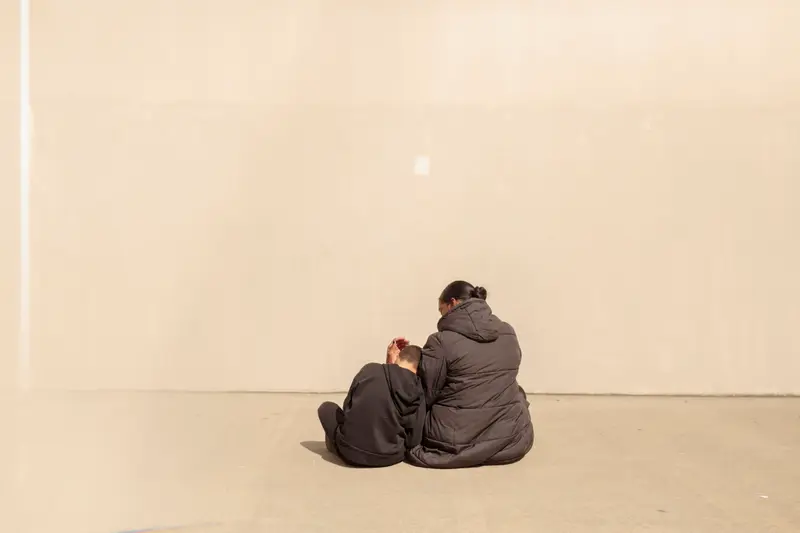
June 23, 2023: The story originally misstated in part the origin of the 87 calls made to 911 between July 2016 and December 2022. The calls originated from Success Academy schools, but some of them were placed by staff, while others were placed by school safety officers working in the building who were not employed by the school.
Clarification, June 21, 2023: The story has been updated to include two different accounts of what happened during an incident in January, as well as the number of suspensions that a student, Ian, was excused from serving.
Clarification, May 26, 2023: This story has been clarified in two places to specify that Success Academy called 911 when requesting an emergency response to students’ misbehavior, removing any ambiguity about whether the police were called directly.
